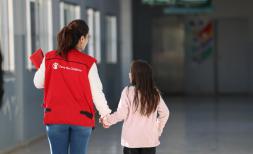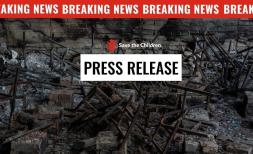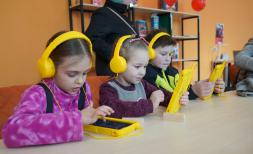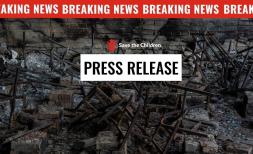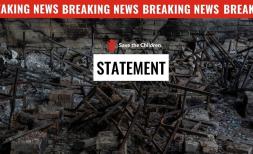Young children “don't have the will to eat” as mental health crisis grips Cabo Delgado
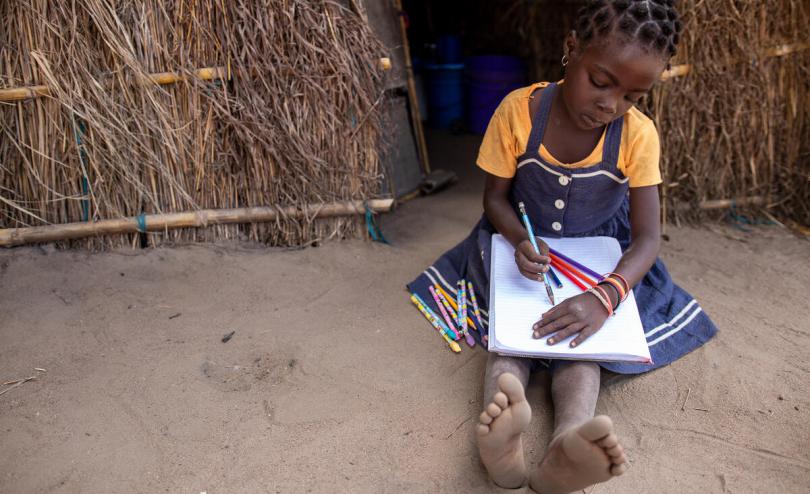
Six-year-old Clara* spent four days hiding in the bush with her mother and younger brother when her village was attacked and her father was killed. Her mother says she is upset and sad, no longer plays with other children and struggles to eat. Photo credit: Sacha Myers/Save the Children
Children displaced by the conflict in Cabo Delgado, Mozambique, are showing signs of severe mental stress and distress, including constant crying and losing the will to eat and play, according to new testimonies collected by Save the Children.
Some of these children are less than 10 years old and have witnessed horrific violence, including the murder of their parents. The aid agency is warning that these children might not recover unless they urgently receive mental health and psychosocial support services.
In some cases documented by Save the Children, children have changed their behaviour multiple times, such as becoming aggressive, withdrawn, or overwhelmed by uncontrollable bouts of crying.
Clara’s* (6) father was killed when her village was attacked in Cabo Delgado. Clara and her mother Mariana* (25) and baby brother Pedro* (3) hid in the bush for four days until they escaped. Mariana told Save the Children:
“The day after the attacks, I went back to my house to pack some things. But it was too late. I found my husband murdered. I didn’t take anything because it was all burnt. I felt like I was breaking inside. I was crying and sad. I didn’t even have a wrap for my baby. I had nothing.
“My baby son doesn’t really know what’s happened, but he keeps asking for his dad. My daughter understands her father is dead. When she found out her father had been killed, she was very sad. She became sick, wouldn’t play with other kids and wouldn’t eat. She was upset and sad for a long time.”
Emerson*’s (8) mother and father were beheaded in the conflict. His sister is still missing. Emerson and his older brother escaped to a transit camp. Save the Children reunited Emerson and his brother with their grandmother Sofia* (46). Sofia told Save the Children:
“I was shocked when the armed men attacked us. The attacks happened early in the morning and we ran and hid in the bush. When we felt it was safe, we went back to check on our families. I discovered my family had been killed.
“Emerson’s parents – my daughter and her husband – had been beheaded. I felt so awful. Even now I still remember the day it happened. The men in our village had enough courage to bury all the bodies together. We could only dig the graves one metre deep because we were scared and had to rush.”
Celina* (8) and Milton’s* (9) mother was beheaded when their village was attacked, and they became separated from their father, who is still missing. They escaped and travelled to a transit camp, where Save the Children helped reunite them with their grandmother Adelia* (55). Adelia told Save the Children:
“[Milton*] was crying for two days and I held him. Me and my neighbour told him to stop crying. In the end he stopped crying. He won't see his parents again. Sometimes he spends time thinking about his parents because he's old enough [to understand what's happened]. He has mental health problems because he cannot see his mother, he can only see me.”
Save the Children has been providing children like Celina, Milton, Emerson and Clara with psychological first aid and mental health support, including helping them re-establish age-appropriate routines and activities to support their journey toward developing a new normal, now that they are safe and reunited with family members.
Clementina, a child protection worker for Save the Children in Cabo Delgado, has provided support to 35 displaced children since June 2020. Clementina said:
“Many children are very sad. They don't have any hope they will find their mother or father again. They show signs they're afraid. They don't have the will to eat or to play because they're thinking about the past, about their parents, about their brothers and sisters. They think about their family. The children are broken-hearted and it's impacting on their mental health and wellbeing.”
Chance Briggs, Save the Children’s Country Director in Mozambique, said:
“The perpetrators of violence in Cabo Delgado are using abhorrent tactics that terrify children. As a parent, it breaks my heart to think of how these kids must be struggling to process the unthinkable. As an organisation that works to protect children, Save the Children is incredibly concerned for their wellbeing and prospect of recovery. There are at least 364,000 children displaced by this conflict. At best, they have been forced to flee from their homes and sense of safety. At worst, they have witnessed horrors no child should see.
“This conflict has flown under the radar long enough. We call on the donor community to ensure that funding for children’s needs is prioritised. The international community’s Humanitarian Response Plan for Cabo Delgado is so far funded at just 13% and funds are urgently needed for protection, for health, for education, for mental health and psychosocial support.
“All parties to this conflict must ensure that children are never targets. They must do their utmost to minimise civilian harm, including ending indiscriminate and disproportionate attacks against children. Greater monitoring and reporting must take place of these violations, including through the Office of the UN Special Representative of the Secretary-General for Children in Armed Conflict mechanism, so that the perpetrators of violence against children can be held to account.”
Since September 2020, the conflict in Cabo Delgado has intensified with reports of increased violations against civilians including sexual violence, beheadings and abductions.
At least 700,000 people, including at least 364,000 children, are now displaced as a result of the conflict in Cabo Delgado. At least 2,909 people have reportedly died in the conflict, including 1,437 civilians, although this number is only reported deaths and it’s expected the true number is much higher. At least 51 children, most of them girls, have been abducted over the past 12 months, although the true number of child abductions is estimated to be far higher.
Save the Children and its partners are responding in support of displaced children and their families in Cabo Delgado. They have reached over 148,000 people, including over 86,000 children who have been displaced by both the conflict and Cyclone Kenneth that struck in 2019, with education and health services, food and livelihoods improvement, and water and sanitation programming. Save the Children has also been providing child protection programming, including family tracing and reunification (for unaccompanied and separated children), and mental health and psychosocial support for separated and unaccompanied children, child victims of abuse, and those showing signs of profound traumatic impacts as the result of the conflict.
*Names changed to protect identities
New content:
Milton* (9), Celina* (8) and Adelia* (55) – violence, displacement, reunification
- Video story, case study and photos
- https://www.contenthubsavethechildren.org/Share/u66ivgw078r177lktm4l7203074a85c4
Clara* (6) and Mariana* (25) – violence, displacement
- Case study and photos
- https://www.contenthubsavethechildren.org/Share/pc56j8305mbu17id845hh622581sdx2h
Emerson* (8) and Sofia* (46)– violence, displacement, reunification
- Case study and photos
- https://www.contenthubsavethechildren.org/Share/vj5501mmv2a52t84620tr4sp0n18ei0b
For questions and interview requests, please contact:
- Daphnee Cook (Nairobi): Daphnee.Cook@savethechildren.org;
- Emily Wight (London): Emily.Wight@savethechildren.org;
- Out of office hours (BST): Media@savethechildren.org.uk, or +44 7831 650 409
